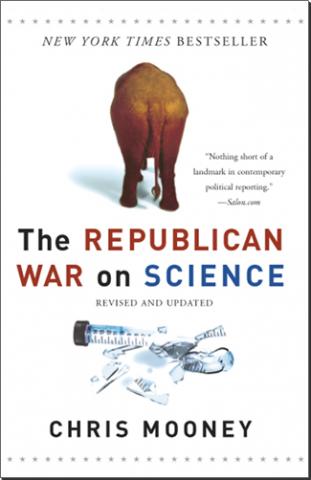UPDATE: The paper discussed below is downloadable here.
For a while now, I’ve been aware of a powerful new paper that directly tests the central argument of my 2005 book The Republican War on Science—and also validates some key claims made in my new book, The Republican Brain. I’ve had to keep quiet about it until now; but at last, the study is out—though I’m not sure yet about a web link to it.
The research is by Gordon Gauchat of the University of North Carolina at Chapel Hill, and published in the prestigious American Sociological Review. In the study, Gauchat uses a vast body of General Social Survey data to test three competing theses about the relationship between science and the U.S. public:
1) the cultural ascendancy thesis or “deficit model” view, according to which better education and engagement with science lead all boats to rise, and citizens across the board become more trusting of scientists and their expertise;
2) the alienation thesis, according to which modernity brings on distrust and disillusionment with science (call it the “spoiled brat” thesis if you’d like); and
3) the politicization thesis—my thesis—according to which some cultural groups, aka conservatives, have a unique fallout with science for reasons tied up with the nature of modern American conservatism, such as its ideology, the growth of its think tank infrastructure, and so on.
The result? Well, Gauchat’s data show that the politicization thesis handily defeats all contenders. More specifically, he demonstrates that there was only really a decline in public trust in science among conservatives in the period from 1974 to 2010 (and among those with high church attendance, but these two things are obviously tightly interrelated).
And not just that.
Gauchat further validates the argument of The Republican War on Science by showing that the decline in trust in science was not linear. It occurred in association with two key “cultural break” points that, I argue in the book, heightened right wing science politicization: The election of Ronald Reagan, and then the election of George W. Bush.
This one figure from the paper really, really says it all:
As you can see, conservatives go down, down, down in their trust in science over the period in question—which, of course, is also the period that thoroughly divided and polarized America.
And it’s not just these new findings that resound. Much of Gauchat’s data also validate key points from my new book The Republican Brain, which is in many ways my deeper elaboration of the arguments of the Republican War on Science.
First, Gauchat shows something I also highlight: Graduate degrees are now much more numerous among liberals, and the graduate education gap between left and right is widening. This factor–reflecting liberals’ greater Openness to scientific information and new ideas, as well as unending conservative attacks on academia (and recourse to ideological think tanks to take its place)–is a key structural force involved in driving conservatives away from science.
Second: Gauchat also captures, once again, the “smart idiot” effect: Conservatives becoming more factually wrong—or, in this case, more distrusting of science, which to me is basically the same thing—as their level of education advances. Here let me quote in full, because frankly, the finding can only be called highly disturbing:
…conservatives with high school degrees, bachelor’s degrees, and graduate degrees all experienced greater distrust in science over time and these declines are statistically significant. In addition, a comparison of predicted probabilities indicates that conservatives with college degrees decline more quickly than those with only a high school degree. These results are quite profound, because they imply that conservative discontent with science was not attributable to the uneducated but to rising distrust among educated conservatives.
The key question to pose, after reading Gauchat’s paper, is why this occurred. Clearly, The Republican War on Science’s politicization thesis is being strongly validated—a thesis that attributes the problem to the growth of a modern conservative movement, its need to appease its core interest groups and constituencies (corporate America, conservative Christians), its need to have its own alternative expertise and journalism (think tanks, Fox, Limbaugh), and so on.
But frankly, I don’t think this thesis goes far enough. That is the whole point of The Republican Brain, where I assert that we need a nature plus nurture account to understand why conservatives deny science and reality. And all of this stuff Gauchat is talking about is sociology—aka, “nurture.” It’s very real, undeniably so–but is it the whole story?
I doubt it. For instance, in their book Authoritarianism and Polarization in American Politics, Marc Hetherington and Jonathan Weiler have shown that as the “New Right” emerged in the U.S. in the wake of the cultural battles of the 1960s and 1970s, it mobilized strong forces of authoritarianism–e.g., psychological rigidity and closed-mindedness. In this era, driven by hot button “culture war” issues, authoritarians moved to the right, leaving behind the Democratic Party, particularly in the South. These were the so-called “Reagan Democrats.”
I find it hard to believe that this trend is not also showing up in Gauchat’s data. If anything, the finding about church attendance kind of gives it away—in the U.S., authoritarians are often biblical fundamentalists.
Whatever the underlying causes, though, the punchline of the story that Gauchat tells—reaffirming the story I have told—is unmistakably grim. We now have a powerful linkage between a powerful political movement in the United States on the one hand, and the denial of science and reality on the other. This not only manifests itself every day in our dysfunctional political debates; it is a gigantic threat to the country’s future and its ability to cope with 21st century problems.
Subscribe to our newsletter
Stay up to date with DeSmog news and alerts







